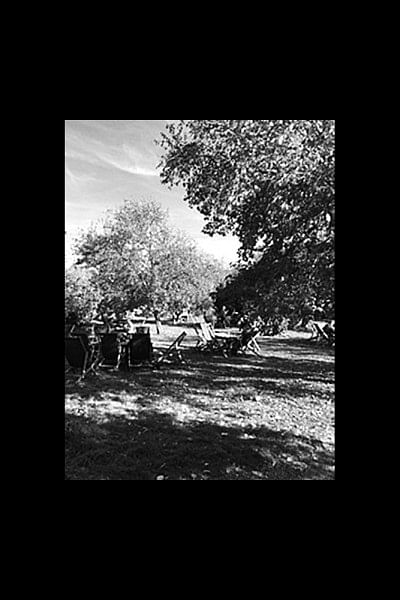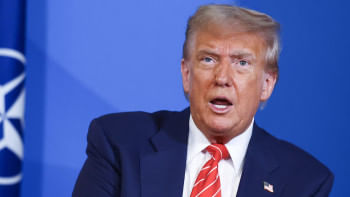Tagore and China: A Cambridge Perspective

Xu Zhimo and his Mentors
Unnoticed I am going away/ Just as nobody saw me come./I clasp my hands and bow my head/As clouds puff up in the west…
Poet Xu Zhimo, after revisiting Cambridge in 1928 and about to visit Śantiniketan on his way home to China, was busy composing a nostalgic poem about the river Cam. Images came to his mind of the river alongside which, as a student at King's College six years before, he had walked on his way to take tea with his mentor and friend, Goldsworthy Lowes Dickinson.
Zhimo would soon be taking tea with his other mentor and friend, Rabindranath Tagore, who had erected a Chinese-style tea-house in his honour in Śantiniketan after a tour he had made of China four years previously at the invitation of his young admirer, whose name he had neatly transposed into Bengali as Śuśima.
It was on returning home following his first stay in Cambridge that Zhimo had invited Rabindranath, after whose Crescent Moon he had named a new modernist group of poets, to make a lecture tour of China. Zhimo had acted not only as host and guide but also as interpreter, protesting he might as well try to transcribe the passionate voice of the nightingale as interpret the thoughts of the poet he so much admired.
The two older men, both nearly 40 years his senior, had tastes in common that attracted Zhimo to them as teachers. Both shared with him a love of Shelley and the English Romantics as well as the classical Chinese poets (recently translated by another of Dickinson's students, Arthur Waley). Both were internationalists who valued the civilization of China, Dickinson having written a book, Letters from John Chinaman (1901), in which in the guise of a Chinese visitor he attacked the meretriciousness of Western life and its exploitative imperialism (which he foresaw would cause a European war).
Rabindranath, who met Dickinson several times and liked him, had translated extracts from this book long before delivering lectures in the same vein on his Chinese visit. In the meantime, however, there had come Dickinson's passage to India (1912-3) in the company of his fellow Hellenist and friend, E.M. Forster, which left both travellers bewildered by Hinduism.
Forster grappled with his bewilderment for a dozen years before writing his Indian novel but Dickinson went on to China and Japan and, in an extended essay on his travels, speculated that Hindu India, "sublime but terrible", differed from all other civilizations, East and West, in that it regarded the material world as ultimately illusory.
Gurudev, though he too had reservations about a life-rejecting strain in Indian civilization, was initially dismayed and finally annoyed by Dickinson's lack of sympathy for India. Dickinson, who had been a guest of the Tagores in Calcutta, suggested there was an unbridgeable gulf: "A Chinese, after all, is not so unlike an Englishman, and a Japanese not so unlike a Frenchman. But a Bengalee is strongly unlike anybody outside India".
Chinese Characteristics
Bengali or otherwise, we too might be dismayed by such essentializing, however tentative, of ever-changing (and in truth multiple) cultures. Dickinson was making a common European distinction between the two great subcontinental civilizations north and south of the Himalaya and felt his affinity to be with the secular Chinese, seen as pursuing since Confucius an ethical code of conduct without religious sanction.
On either side of the great mountains, there often do seem to be different geniuses at work that may at best be described as complementary. Buddha, the Indian most obviously influential on China, grew distinctly more worldly there, even to laughing and becoming pot-bellied. While China does have its ascetic lohans just as India its pot-bellied Ganesh, it has put a characteristic Chinese stamp on major foreign influences, whether on Islam in the Great Mosque in Xi'an, Christianity in the Tai'ping Heavenly Rebellion or Communism in the Long March.
Whatever the past, does the present tell a different story? Perhaps the West has had the deleterious effect on their cultured China both Dickinson and Tagore feared it might have. The new Celestial Empire, having (understandably) redrawn the old British imperial border in the Himalaya that in truth ought always to have been left to the frozen snows to delineate, is today spilling over to establish the infrastructure for its own treaty ports on the Indian Ocean.
Zhimo, with his discrete comings and goings, is serving as a soft power diplomat in both Cambridge and Bengal. In Cambridge, a white marble stone commemorating Zhimo's poem of farewell to the Cam, learnt by heart by schoolchildren all over China, has become a (chargeable) feature in the grounds of King's College, coinciding with a massive influx of mainland Chinese tourists.
Meanwhile, in a book of informative essays on Tagore and China, fruits of a seminar in Beijing, one of its co-editors, Tan Chung, has taken Rabindranath's visit to China, like those of Buddhist sages of old, to be indicative of an enduring friendship between China and India: "One point four billions of Chinese say 'Tagore belongs to us', just as one billion Indians have 'our Tagore'".
Even if we make allowance for a sentimental Chinese propensity to see in the personal something collective and symbolic (and Rabindranath himself did initially see himself as representing India, if not speaking for all Asia), we may remain sceptical of the attribution of something personal, friendship, to the relationship of nation-states, guided as these are by realpolitik.
The establishment of Cheena-Bhavana at Śantiniketan was specifically designed to foster fruitful contact between individuals on either side of the Himalaya, none more remarkable than Tan Chung's father, Tan Yun-shan, who spent a life-time there.
Politics and Poetry
The acclaim with which Rabindranath was received in China was partly on account of his stature as a Nobel prize-winner: at a time of oppressive British imperialism in both countries, the otherwise Eurocentric award afforded pride to millions of Asians, though the poet in Rabindranath likened its possession to having a tin-can tied to a dog's tail and might take greater delight from the fact that boat-people on the(unabridged) Padma sang, and still sing, his songs.
Gurudev's image as an Indian sage (of which the poet in him was always sceptical) proved more problematic. Young radicals of the May 4th Movement attacked him for lauding traditional Chinese culture and emphasizing spirituality at the expense of the need for material change. As Chinese society moved increasingly left, Zhimo, though he had his own trenchant criticisms of a sclerotic Confucian tradition, was similarly censured for his romantic idealism.
The politically engaged may not always grasp that poets are both traditional, in that they wrestle with a language that has been turned on the tongues of many millions dead and alive, and radical, in that they aim to wring from this a distinctive contemporary voice. No doubt the poetic spirit informed Rabindranath's lectures in China but they were lectures, not poetry, and were heard for their political implications.
Rabindranath's Chinese visit was only part of a lifetime's perambulation around the whole world. While it can be rendered symbolically in terms of inter-nationalsolidarity, especially in the colonial context, we may prefer to see it today as an example of the comradeship poets can feel with each other given the perils of their (solitary) vocation.
When Rabindranath visited a turbulent China again five years later (en route to and from Japan and North America), it was simply to stay privately with Zhimo and his wife in Shanghai. His hosts met him in some trepidation, apologizing because their house was so small. To which Tagore replied: "The smaller, the better". That's the poet speaking.
John Drew has lived on both sides of the Himalaya.

 For all latest news, follow The Daily Star's Google News channel.
For all latest news, follow The Daily Star's Google News channel. 



Comments